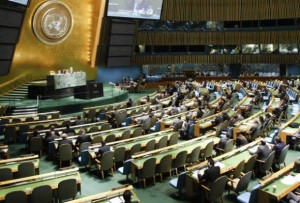A high-profile meeting of the Saudi and European businessmen will be held at the French consulate in Jeddah (Sunday 18th November 2012). This meeting titled “European Business Group Event,” the first of its kind to be organized by the Riyadh-based Delegation of the European Union to the Gulf Cooperation Council (GCC) states in the Kingdom, is expected to attract about 300 attendees, mainly top-notch Saudi and European businessmen and decision-makers, as well as industry leaders.
This was disclosed by Ambassador Adam Kulach, head of the EU Delegation in Riyadh yesterday. “This business meeting is being organized in response to the initiative of the EU member states and their diplomatic missions in the Kingdom,” said Kulach, adding that the event will be attended by heads of the business councils of different EU member states, which have been meeting with their Saudi counterparts bilaterally until now.
In his interview, Kulach spoke about the progressively growing relations between the GCC and the EU with special reference to the closer ties in the fields of education and culture. He briefly spoke about the EU’s Erasmus Mundus program, which supports students from the Gulf states to pursue education in a consortium of European universities. Kulach also spoke about several EU Delegation’s future programs and events. He also pointed out that there will be substantial EU participation in the UN Framework Convention on Climate Change (UNFCCC) conference in Doha.
The conference, which will take place from November 26 to December 7, will be a very important environmental event. In fact, the Doha Summit faces a number of significant challenges, including the need to extend the Kyoto Protocol before it lapses at the end of the year. It also requires diplomats to agree a roadmap for delivering a new legally-binding climate change treaty that can be agreed by 2015 and brought into effect from 2020.
Asked about the participation of diplomats and businessmen in Jeddah meeting today, he said that the meeting will be attended by representatives of the business councils of France, the UK, Italy, Germany and Austria. “Saudi Arabia is a major trading partner of the 27-member EU bloc,” said the envoy, adding that the EU member states see tremendous potential in Saudi Arabia. He said this meeting will bring together business representatives and EU officials including diplomats on one platform to discuss how the two sides can seize opportunities to boost commercial links further.
He said the event in Jeddah will reaffirm EU’s commitment to the development of relations with the Kingdom. It will also reaffirm the EU’s desire to achieve a qualitative improvement in Saudi-EU ties, while the event will help to reinforce EU-GCC cooperation also. There will be substantial representation at the meeting from the Council of Saudi Chambers and from several Saudi business houses, he added. To this end, Kulach noted that the European Union has been one of the most important trading and investment partner of Saudi Arabia.
The EU today is the world’s largest single market with a population of more than 500 million people. The EU as bloc imported Euros28 billion worth of goods and services from Saudi Arabia last year. EU exports have been in the region of Euros 26 billion annually. In fact, imports from Saudi Arabiaincreased by 71 percent last year compared to a year before, he noted.
“Moreover, we are working within the framework of the GCC-EU joint action plan further,” he said.
He pointed out that the EU and GCC have established solid platforms for dialogue and regular consultations on issues of mutual concerns. In the field of education, Kulach said that the Kingdom and EU are working closely now. This is a promising area of engagement, he noted. “At least 30,000 students are studying at different universities across the European Union region,” said Ambassador Kulach, adding that the Kingdom and EU are on the right tracks to promote a comprehensive cooperation program in this field.
A simple look at the demographic development in the GCC countries reveals a structure that has children and students making up a majority. Hence, there is a greater scope in the field of education for EU and for GCC states including Saudi Arabia. Currently there are about eight million students in the GCC countries in the 6-18 age groups. At the higher education level, students’ enrolment figures are rapidly growing across the Gulf states.
This growth pattern of Saudi and Gulf students will also be seen eventually in the European academic institutions, said the envoy, while appreciating the King Abdullah Scholarship Program. He said that the Gulf states are of considerable political, economic and cultural significance for the European Union. A prosperous and stable Gulf region, having close economic and political relations with Europe, is in the best interests of the EU, he added. The relationship between the EU and the GCC is governed by a cooperation agreement signed way back in 1988 as well as a joint action program agreed by the two blocs in 2010.







